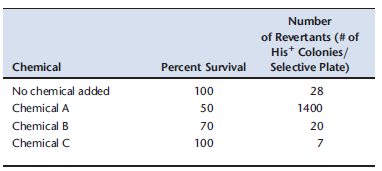
Molecular Biology of the Gene 7th Edition by Richard Losick, James Watson, Michael Levine, Tamara Baker, Alexander Gann
Edition 7ISBN: 9780321762436
Molecular Biology of the Gene 7th Edition by Richard Losick, James Watson, Michael Levine, Tamara Baker, Alexander Gann
Edition 7ISBN: 9780321762436 Exercise 15
There are many claims that certain chemicals that you encounter in daily life are mutagenic. You are interested in learning if chemicals that you commonly use are mutagenic.
To do so, you choose to use the Ames test to test for reversion of a point mutation in the HisG gene in Salmonella typhimurium. You added a chemical into the growth medium for the bacteria. Assume you plated an equal number of cells for each mutagenesis plate. You also calculated percent survival for chemical-treated cells relative to untreated cells. Remember that the plate media for survival is not selective. A summary of the results is shown below.

A. What medium must be used in the selective plate as part of the Ames test? Explain how a mutation gives rise to a rever-tant in this experiment. Be specific.
B. You are initially surprised to see revertants in the absence of any chemical that you are testing, but you realize that this is normal. Give a specific example of how a revertant can arise in the absence of an added mutagen.
C. Which chemical(s) would you identify as containing a mutagen? Explain your reasoning.
D. Which chemical(s) would you identify as possibly antimu-tagenic? Explain your reasoning.
To do so, you choose to use the Ames test to test for reversion of a point mutation in the HisG gene in Salmonella typhimurium. You added a chemical into the growth medium for the bacteria. Assume you plated an equal number of cells for each mutagenesis plate. You also calculated percent survival for chemical-treated cells relative to untreated cells. Remember that the plate media for survival is not selective. A summary of the results is shown below.

A. What medium must be used in the selective plate as part of the Ames test? Explain how a mutation gives rise to a rever-tant in this experiment. Be specific.
B. You are initially surprised to see revertants in the absence of any chemical that you are testing, but you realize that this is normal. Give a specific example of how a revertant can arise in the absence of an added mutagen.
C. Which chemical(s) would you identify as containing a mutagen? Explain your reasoning.
D. Which chemical(s) would you identify as possibly antimu-tagenic? Explain your reasoning.
Explanation
The bacterium Salmonella typhimurium has...
Molecular Biology of the Gene 7th Edition by Richard Losick, James Watson, Michael Levine, Tamara Baker, Alexander Gann
Why don’t you like this exercise?
Other Minimum 8 character and maximum 255 character
Character 255


